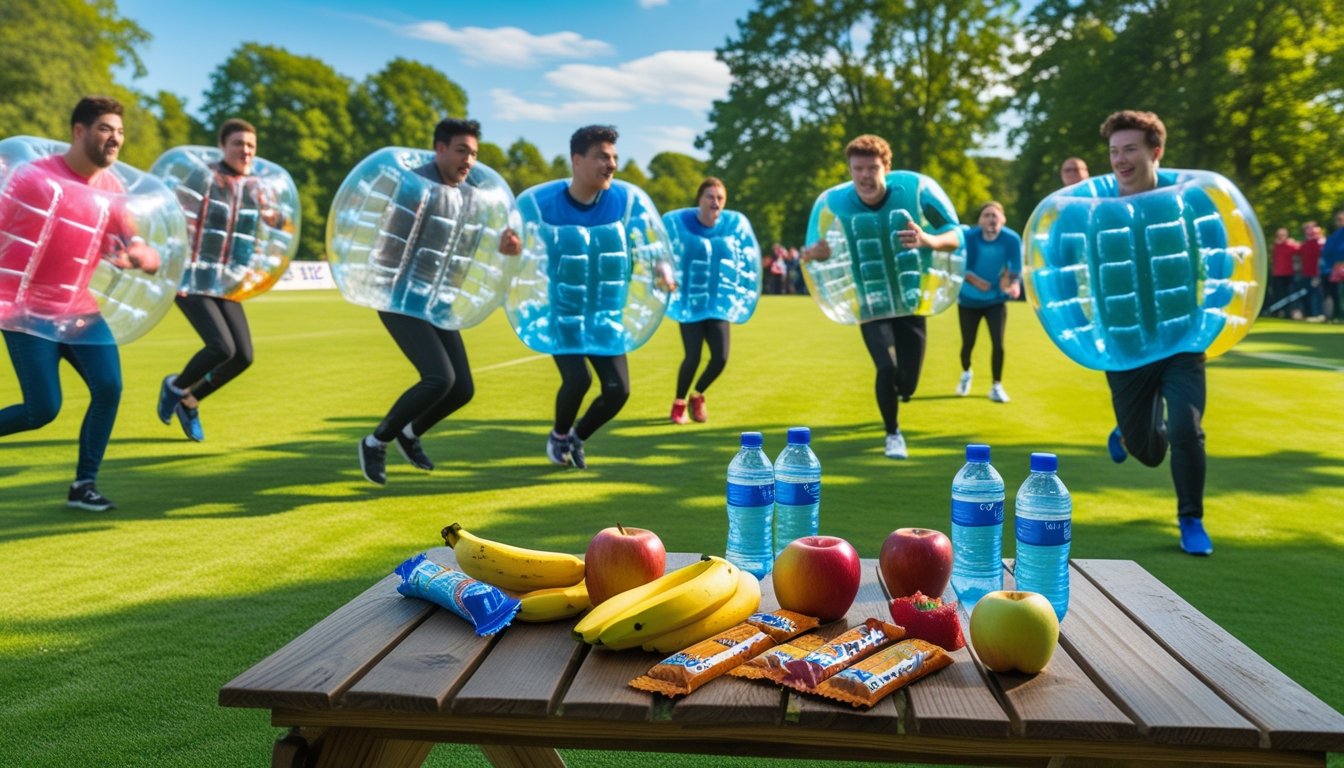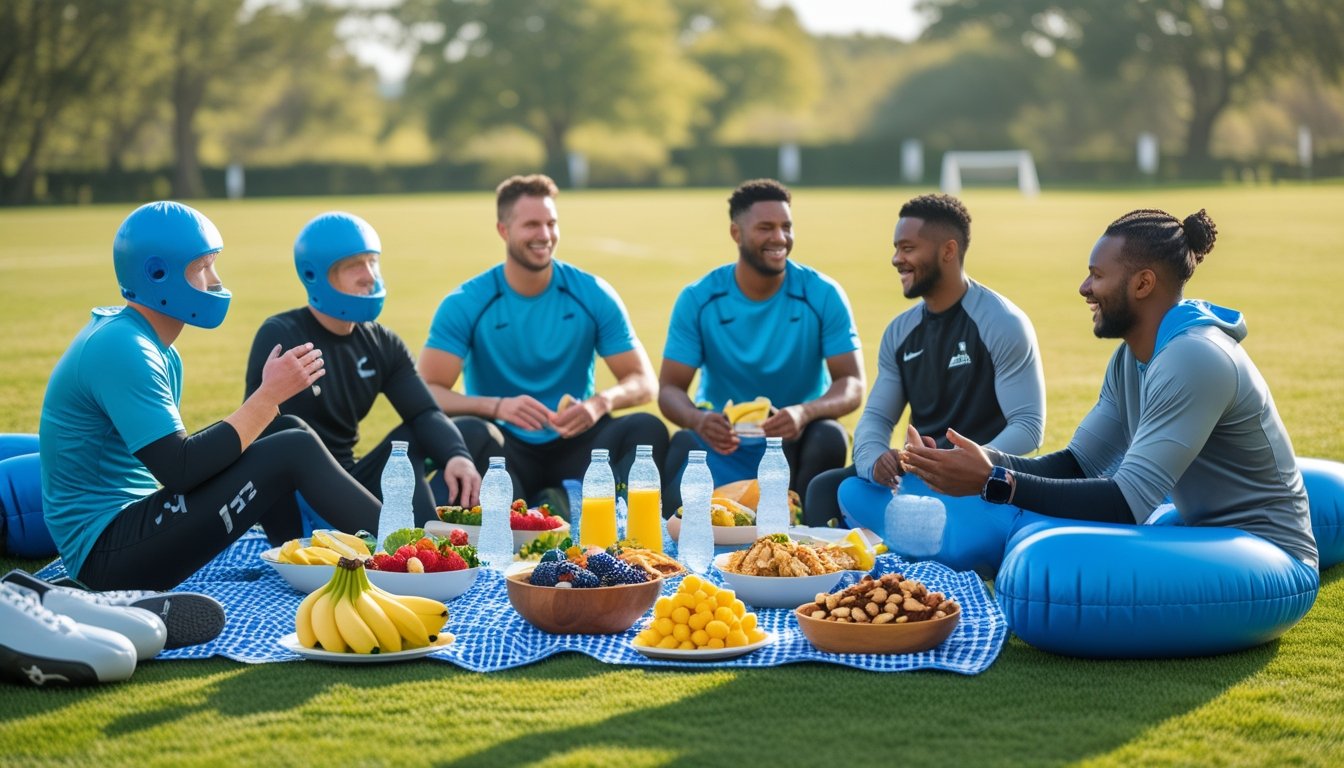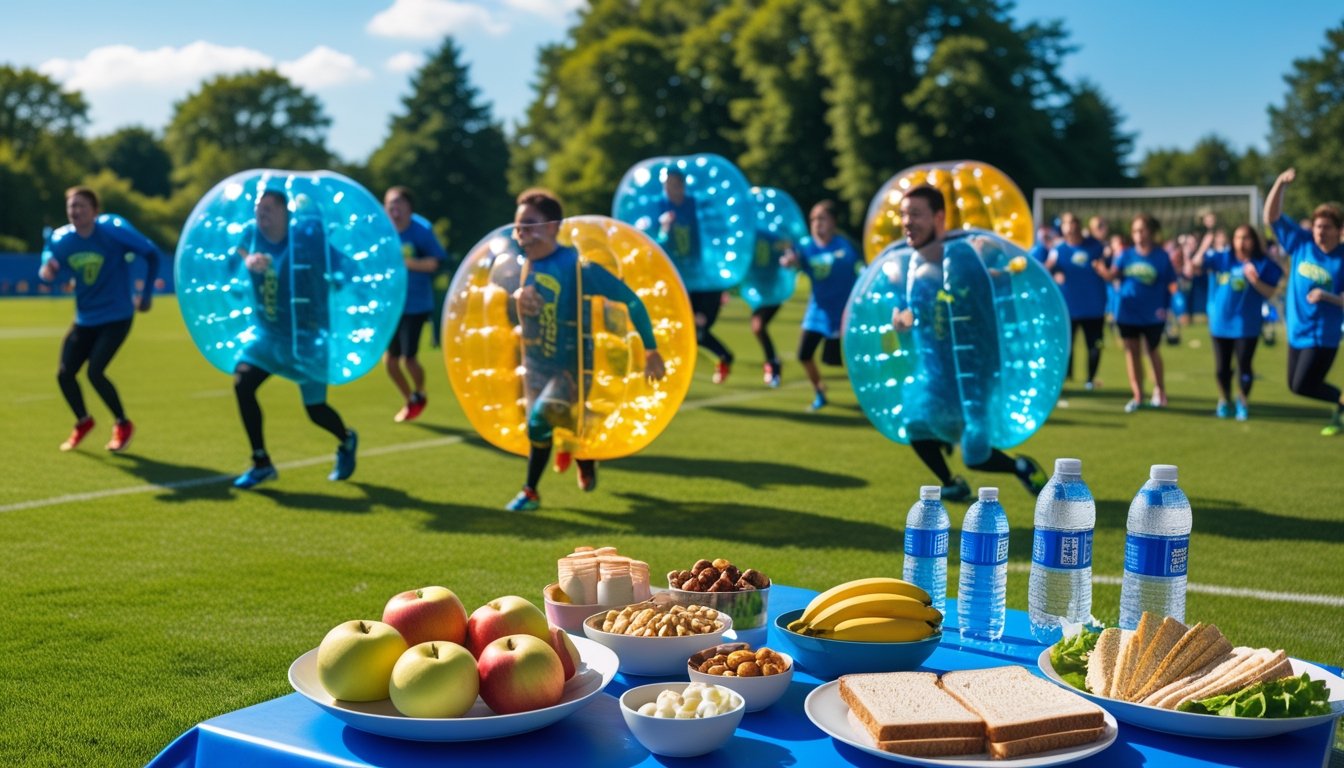Late updated: 13 Jun 2025 10:06
Written by: Emma Saunders
Bubble Football Game Day Nutrition Guide: Fuel Up for Optimal Performance
Nutrition plays a pivotal role in ensuring peak performance and swift recovery in bubble football, a variant of traditional football that's becoming increasingly popular. While the sport may seem more carefree due to the amusement of bouncing around in large inflatable bubbles, the demands on your body are just as real as in conventional football. Game day nutrition can be the difference between a burst of energy and dwindling stamina, so it's essential to fuel correctly before, during, and after the game.

We want our players to step onto the pitch with the right fuel in their system, which means carbo-loading efficiently and hydrating well. Prioritising meals rich in carbohydrates and proteins before you play can maximise your energy reserves and keep you charged throughout the match. In addition, hydration cannot be ignored as it balances electrolyte levels, aiding in peak performance and guarding against fatigue.
Post-match recovery is just as crucial as the pre-game rituals. Eating the right nutrients after playing helps repair muscles and restore energy levels, ensuring you're ready to bounce back stronger for the next match. With the right approach to bubble football nutrition, each game day promises to be a rewarding experience for us all, helping us perform at our best and enjoy the game to the fullest.
Key Takeaways
- Pre-game nutrition impacts energy and performance.
- Hydration is crucial for maintaining stamina.
- Post-game recovery fuels muscle repair.
Essential Game Day Nutrition Strategies
Achieving peak performance in bubble football requires careful planning around nutrition. Key areas include balancing macronutrients, timing meals correctly, staying hydrated, and knowing which foods to avoid. These strategies will help us maximise energy, enhance recovery, and avoid common pitfalls on match day.
Macronutrient Balance for Peak Performance
Our game day nutrition should focus on the optimal balance of carbohydrates, proteins, and healthy fats. Carbohydrates are our primary energy source, so incorporating complex carbohydrates like whole grains provides sustained energy. Proteins, such as lean meats or legumes, support muscle repair and strength. Healthy fats, like those from nuts or avocados, provide additional energy stores. Ensuring each meal is balanced with these macronutrients helps us maintain energy levels and optimise performance throughout the game.
Pre-Game Meal Timing and Food Choices
Timing our meals is crucial. We should aim to eat a substantial meal 3-4 hours before the game, featuring easy-to-digest foods such as grilled chicken and brown rice. This provides ample time for digestion and energy absorption. A light snack, such as a banana or an energy bar, around an hour prior to the match can offer an energy boost. Avoid high-fat or high-fibre foods in the pre-game meal, as they may lead to digestive discomfort.
Hydration and Electrolyte Optimisation
Proper hydration is essential for maintaining performance and mental clarity. We should begin hydrating the day before with water and electrolyte-rich drinks. During the match, sipping water or an electrolyte solution helps replenish lost minerals. Key minerals such as sodium and potassium, found in sports drinks, aid in preventing cramps and maintaining fluid balance. A tailored hydration plan ensures we're rehydrated effectively before, during, and after the game.
Foods and Habits to Avoid on Match Day
Certain foods and habits can negatively impact our performance. Simple sugars, such as sweets or sugary drinks, may lead to blood sugar spikes and crashes. High-caffeine beverages can cause jitters or dehydration. Large, greasy meals are harder to digest and may cause lethargy. Avoid trying new foods on match day to prevent digestive issues. Stick to familiar meals that have proven successful in past games to maintain focus and energy.
Post-Match Recovery Nutrition

Proper post-match recovery nutrition is essential to repair muscles, replenish glycogen stores, and boost energy levels. By focusing on immediate refuelling and smart snacking, we can support muscle repair and sustain energy, while rest and sleep ensure long-term athletic performance.
Immediate Refuelling for Muscle Repair
After a bubble football match, muscles need prompt attention with optimal nutrition to jumpstart recovery. Consuming protein and carbohydrates within 30 minutes post-game aids in muscle repair and replenishes depleted glycogen stores. A ratio of 3:1 (carbohydrates to protein) is ideal. Consider a recovery meal such as grilled chicken with a whole-grain roll or a protein shake with a banana. Protein aids in muscle repair; carbohydrates restore energy, enhancing our recovery process.
Smart Snacking for Sustained Energy
Consistent energy intake is key for ongoing recovery. Opt for snacks that combine healthy fats, proteins, and carbohydrates to maintain energy levels. Consider trail mix with nuts and dried fruit or whole-grain energy bars. These snacks stabilise our blood sugar and promote endurance. Remember, the quality of our snacks can influence recovery speed and future performance. Eating smaller meals every few hours keeps energy consistent.
Rest, Sleep, and Long-Term Performance
Nutrition isn't the only factor in recovery; rest and sleep are equally crucial. Adequate sleep allows for muscle repair and the enhancement of athletic performance. During sleep, our bodies produce growth hormones that aid recovery. Creating a relaxing bedtime routine can improve sleep quality. Aim for 7-9 hours to ensure full benefit. Consistent, restful sleep is an investment in our future performance and endurance on the field.
Frequently Asked Questions

Gameday nutrition for bubble football involves thoughtful meal planning. Early, nutritious meals provide vital energy. Proper hydration and balanced macro intake lead to optimal performance.
What should players consume for breakfast before an early football match?
For an early match, players should eat a breakfast rich in complex carbohydrates and protein. Options include whole-grain toast with eggs or a banana and yoghurt parfait. These choices offer energy and aid concentration.
How does the 4-2-1 nutritional rule apply to athletes’ game day diets?
The 4-2-1 rule advises consuming meals 4, 2, and 1 hour before exercise. Each meal should progressively get lighter. This approach ensures sustained energy without gastrointestinal discomfort, allowing optimal performance.
What are optimal meal choices for football players on the day of the game?
On match day, meals should include a balance of carbohydrates, proteins, and fats. Porridge with berries and nuts or chicken with sweet potatoes and vegetables are effective. They supply energy and aid recovery.
Which foods provide sustained energy for basketball players before a match?
Basketball players need foods high in complex carbohydrates. Oatmeal with fruit or brown rice and turkey are effective. These provide slowly-released energy, maintaining endurance throughout the game.
Can you suggest some pre-game meal ideas for athletes that aid performance?
Pre-game meals should be light yet nutritious. Options include grilled chicken sandwiches or pasta with vegetables. These meals are easy to digest and provide essential nutrients for performance.
What nutritional strategy should football players follow throughout game day?
Football players should maintain hydration and consume small meals regularly. Balancing carbohydrates, proteins, and fats sustains energy levels. Continual intake of fluids with electrolytes is essential to prevent dehydration.
